学术综合英语unit
学术综合英语unit1unit5课后翻译及答案
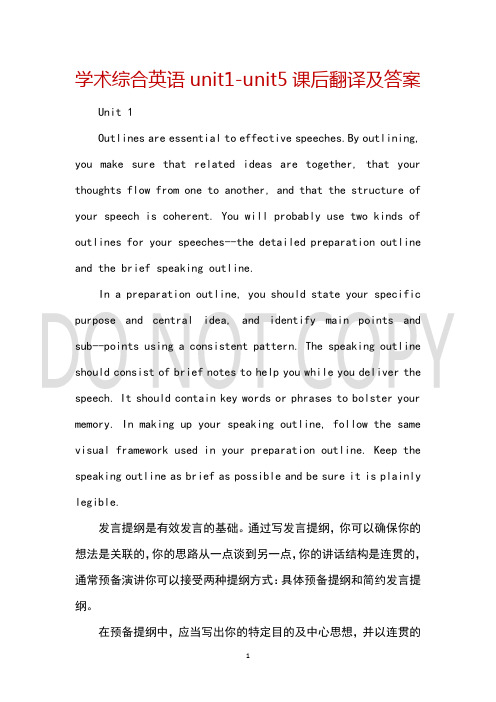
学术综合英语unit1-unit5课后翻译及答案 Unit 1Outlines are essential to effective speeches.By outlining, you make sure that related ideas are together, that your thoughts flow from one to another, and that the structure of your speech is coherent. You will probably use two kinds of outlines for your speeches--the detailed preparation outline and the brief speaking outline.In a preparation outline, you should state your specific purpose and central idea, and identify main points and sub--points using a consistent pattern. The speaking outline should consist of brief notes to help you while you deliver the speech. It should contain key words or phrases to bolster your memory. In making up your speaking outline, follow the same visual framework used in your preparation outline. Keep the speaking outline as brief as possible and be sure it is plainly legible.发言提纲是有效发言的基础。
学术英语-综合-Unit-7.pptx学术英语-综合-Unit-7

Unit 7
Sociology
Text A Supplementary information
1. Life satisfaction
Life satisfaction is the way a person perceives how his or her life has been, how they feel about and where it is going in the future. It is a measure of well-being and may be assessed in terms of mood, satisfaction with relations with others and with achieved goals, self-concepts, and self-perceived ability to cope with daily life. It is having a favorable attitude of one’s life as a whole rather than their current feelings. Life satisfaction has been measured in relation to economic standing, amount of education, experiences, and the people’s residence as well as many other topics.
学术英语 综合
Academic English — An Integrated Course
Unit 7
Sociology
Unit Contents
Unit objectives
新核心综合学术英语教程Unit

• “while” is used to introduce a different situation to compare with the content(s) before;
• “so” stands for “environmentally friendly”, as mentioned in the former part of the sentence.
to supplement or refute what the speakers said.
会议开得很活跃,不拘束,每个人都能插话补充,或反驳发言者的讲话。
精选课件
7
Reading 2
Language Points
6. inherent (L63, para. J)adj.固有的,内在的,天生的 • I think racism is unconsciously inherent in practically everyone.
我同意发言者对所做的事加以谴责。
• Wealth and happiness do not always concur. (同时发生)
财富与幸福并非总是并存的.
5. refute(L48, para. H)vt.否认真实性;驳斥,批驳(观点、指责 或理论) If you refute an argument, accusation, or theory, you
reported last November. 这一结果似乎和去年11月美国研究人员发表的一项
重要成果相矛盾。
精选课件
6
Reading 2
学术英语综合-Unit-6

4. Speaking
• Analyze the audience and purpose of the speech
5. Writing
• Achieve coherence in research paper writing
Now work in pairs and share your answers with your partner.
9
Unit 6
Text A Overview
Mathematics
Summarize the main ideas of Text A on the basis
of Task 1/Critical Reading and Thinking/Text A.
• Learn to use words or phrases indicating exemplification;
• Comprehend stylistic differences between formal and informal English and acquire some formal expressions
4. Speaking
• Analyze the audience and purpose of the speech
5. Writing
• Achieve coherence in research paper writing
7
Unit 6
Mathematics
Unit Objectives
6. Researching
• Learn to interview peers and summarize what is found from the interview
学术综合英语参考答案unit3
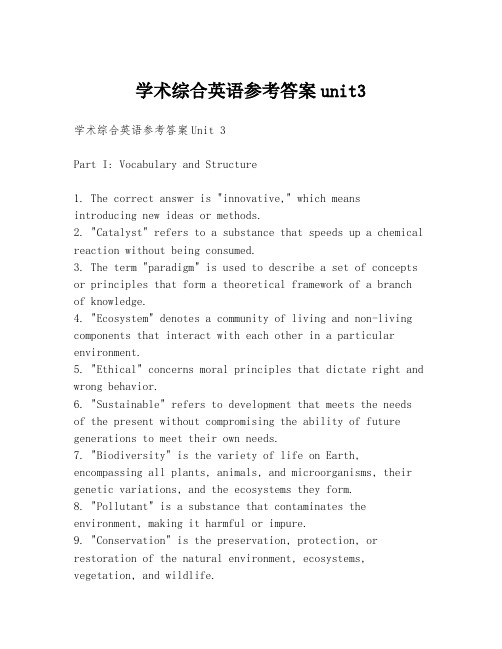
学术综合英语参考答案unit3学术综合英语参考答案Unit 3Part I: Vocabulary and Structure1. The correct answer is "innovative," which means introducing new ideas or methods.2. "Catalyst" refers to a substance that speeds up a chemical reaction without being consumed.3. The term "paradigm" is used to describe a set of concepts or principles that form a theoretical framework of a branch of knowledge.4. "Ecosystem" denotes a community of living and non-living components that interact with each other in a particular environment.5. "Ethical" concerns moral principles that dictate right and wrong behavior.6. "Sustainable" refers to development that meets the needs of the present without compromising the ability of future generations to meet their own needs.7. "Biodiversity" is the variety of life on Earth, encompassing all plants, animals, and microorganisms, their genetic variations, and the ecosystems they form.8. "Pollutant" is a substance that contaminates the environment, making it harmful or impure.9. "Conservation" is the preservation, protection, or restoration of the natural environment, ecosystems, vegetation, and wildlife.10. "Renewable" describes resources that can be replenished naturally and sustainably over time.Part II: Reading ComprehensionA. True or False Questions1. True. The passage states that the use of renewable energy sources can reduce reliance on fossil fuels.2. False. The text mentions that while renewable energy can help reduce greenhouse gas emissions, it does not completely eliminate them.3. True. The passage highlights the importance of researchand development in advancing renewable energy technologies.4. False. The text indicates that while renewable energy is abundant, it can be inconsistent, requiring storage solutions.5. True. The passage discusses the potential for renewable energy to create jobs and stimulate economic growth.B. Multiple Choice Questions1. C. The passage mentions that solar power is a clean and inexhaustible source of energy.2. B. The text explains that wind turbines convert windenergy into electricity.3. A. The passage states that hydroelectric power isgenerated by the movement of water.4. D. The text describes bioenergy as energy derived from organic material.5. E. The passage mentions that geothermal energy is heatfrom the Earth's interior.C. Fill in the Blanks1. photovoltaic cells2. carbon footprint3. intermittency4. energy storage5. grid integrationPart III: Cloze Test1. sustainable2. innovative3. paradigm4. ecosystem5. pollutants6. ethical7. biodiversity8. renewable9. conservation10. catalystPart IV: Writing TaskIn this section, you are asked to write an essay on the topic of "The Importance of Renewable Energy in the 21st Century." Your essay should cover the following points:- The increasing demand for energy and the challenges of relying on fossil fuels.- The benefits of renewable energy sources, such as solar,wind, and hydroelectric power.- The role of technology in advancing renewable energy solutions.- The economic and environmental implications of a transition to renewable energy.- The need for policy support and public awareness to promote the adoption of renewable energy.Sample Essay:The 21st century has ushered in an era of unprecedented energy demand, driven by global population growth and industrialization. Traditional fossil fuels, while abundant, present significant challenges, including environmental degradation and the potential for resource depletion. In contrast, renewable energy sources offer a sustainable alternative that can help mitigate these issues.Renewable energy, derived from the sun, wind, and water, among other sources, is inexhaustible and clean. Solar panels convert sunlight into electricity, wind turbines harness the power of the wind, and hydroelectric dams utilize the force of flowing water. These technologies not only reduce greenhouse gas emissions but also decrease our dependence on finite resources.Advancements in technology have made renewable energy more efficient and cost-effective. Innovations in energy storage and grid integration are addressing the intermittency of renewable sources, making them more reliable and accessible. Furthermore, the transition to renewable energy is aneconomic opportunity, with the potential to create new jobs and stimulate growth in the clean energy sector.However, the shift to renewable energy requires robust policy support and public awareness. Governments must enact incentives for renewable energy development and implement regulations that reduce the environmental impact oftraditional energy sources. Public education campaigns can also play a crucial role in fostering a societal understanding of the benefits of renewable energy and encouraging its adoption.In conclusion, the importance of renewable energy in the 21st century cannot be overstated. As we face the dual challenges of energy scarcity and environmental sustainability, renewable energy offers a promising path forward. With continued innovation, policy support, and public engagement, we can harness the power of the sun, wind, and water to build a cleaner。
学术综合英语参考答案unit1
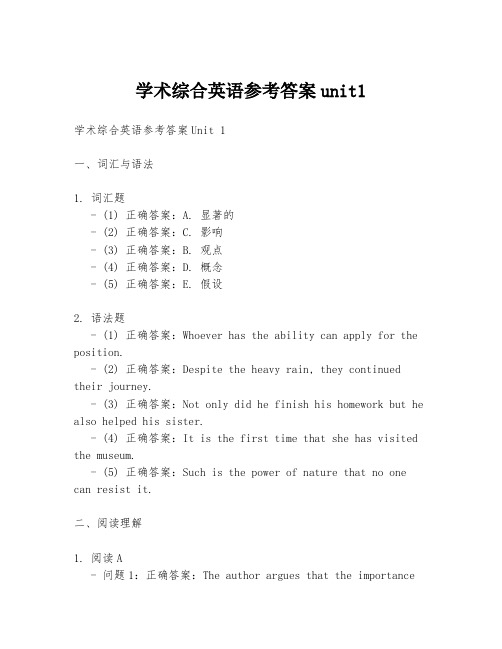
学术综合英语参考答案unit1学术综合英语参考答案Unit 1一、词汇与语法1. 词汇题- (1) 正确答案:A. 显著的- (2) 正确答案:C. 影响- (3) 正确答案:B. 观点- (4) 正确答案:D. 概念- (5) 正确答案:E. 假设2. 语法题- (1) 正确答案:Whoever has the ability can apply for the position.- (2) 正确答案:Despite the heavy rain, they continued their journey.- (3) 正确答案:Not only did he finish his homework but he also helped his sister.- (4) 正确答案:It is the first time that she has visited the museum.- (5) 正确答案:Such is the power of nature that no one can resist it.二、阅读理解1. 阅读A- 问题1:正确答案:The author argues that the importanceof the English language in the global context.- 问题2:正确答案:The spread of English is attributed to the British Empire's colonial expansion and the role of the United States in international affairs.- 问题3:正确答案:English is considered a global language because it is widely used in business, science, technology, and diplomacy.2. 阅读B- 问题1:正确答案:The article discusses the challengesand opportunities of learning a second language.- 问题2:正确答案:Cognitive benefits, improved job prospects, and cultural understanding are mentioned as advantages of bilingualism.- 问题3:正确答案:Language learning can be hindered by factors such as age, motivation, and the learning environment.三、完形填空1. 正确答案:- (1) B. 影响- (2) A. 显著的- (3) D. 观点- (4) C. 概念- (5) E. 假设- (6) F. 假设- (7) G. 观点- (8) H. 影响- (9) I. 显著的- (10) J. 概念四、翻译1. 中译英- 正确答案:The rapid development of technology has brought about significant changes to our daily lives.2. 英译中- 正确答案:全球化不仅促进了国际贸易,也增进了不同文化之间的理解和尊重。
学术综合英语unit1课后答案 罗立胜
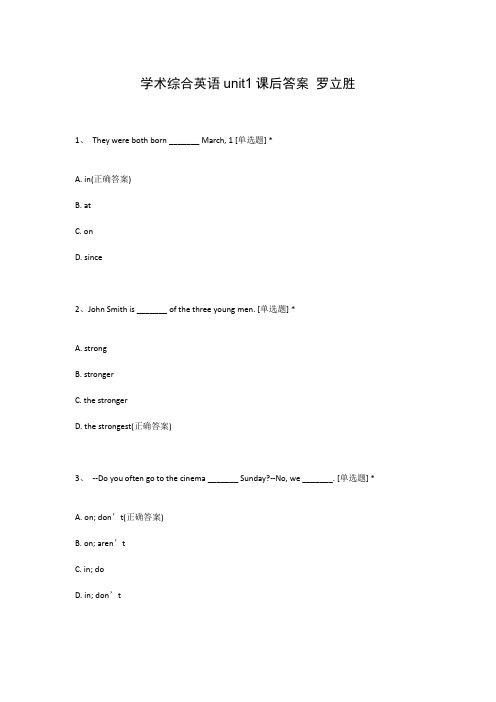
学术综合英语unit1课后答案罗立胜1、They were both born _______ March, 1 [单选题] *A. in(正确答案)B. atC. onD. since2、John Smith is _______ of the three young men. [单选题] *A. strongB. strongerC. the strongerD. the strongest(正确答案)3、--Do you often go to the cinema _______ Sunday?--No, we _______. [单选题] *A. on; don’t(正确答案)B. on; aren’tC. in; doD. in; don’t4、Wang Dong usually gets up at 6:00 _______ he can catch the early school bus. [单选题] *A. as ifB. so that(正确答案)C. untilD. after5、-Do you have tickets for Friday? -Sorry, we've got _____ left. [单选题] *A. eitherB. none(正确答案)C. no oneD. neither6、—Look at those purple gloves! Are they ______, Mary?—No, they aren’t. ______ are pink. ()[单选题] *A. you; IB. your; MyC. yours; Mine(正确答案)D. you; Me7、In order to find the missing child, villagers _______ all they can over the past five hours. [单选题] *A. didB. doC. had doneD. have been doing(正确答案)8、The()majority of the members were against the idea. [单选题] *A. substantialB. enormousC. considerable(正确答案)D. overwhelming9、30.It is known that ipad is _________ for the old to use. [单选题] * A.enough easyB.easy enough (正确答案)C.enough easilyD.easily enough10、There are still some wild tigers alive. [单选题] *A. 聪明的B. 凶恶的C. 野生的(正确答案)D. 珍贵的11、You needn’t _______ me. I’m old enough to take care of myself. [单选题] *A. worry about(正确答案)B. write downC. put awayD. wake up12、The city is famous _______ its beautiful scenery. [单选题] *A. for(正确答案)B. ofC. asD. to13、It is my _______ to meet you here. [单选题] *A. pleasure(正确答案)B. pleaseC. pleasedD. pleasant14、—Are these your sheep? [单选题] *A)on grass at the foot of the hill.(正确答案)B. feedC.is fedD. is feeding15、- I haven't been to Guilin yet.- I haven t been there, ______. [单选题] *A. tooB. alsoC. either(正确答案)D. neither16、Jim wants to hang out with his friends at night, but his parents don’t allow him ______ so. ()[单选题] *A. doB. doneC. to do(正确答案)D. doing17、2.The villagers want to have a bridge. Can this dream ________? [单选题] *A.come outB.get awayC.come true(正确答案)D.get out18、In fact, Beethoven did something brave than dying. [单选题] *A. 勇敢(正确答案)B. 冒险C. 可怕D. 奇妙19、Last week they _______ in climbing the Yuelu Mountain. [单选题] *A. succeeded(正确答案)B. succeedC. successD. successful20、Either you or the president()the prizes to these gifted winners at the meeting. [单选题] *A. is handing outB. are to hand outC. are handing outD. is to hand out(正确答案)21、The plane arrived at London airport _______ Wednesday morning. [单选题] *A. on(正确答案)B. atC. inD. for22、She is a girl, _______ name is Lily. [单选题] *A. whose(正确答案)B. whoC. whichD. that23、He does ______ in math.()[单选题] *A. goodB. betterC. well(正确答案)D. best24、She _______ love cats, but one attacked her and she doesn’t like them anymore. [单选题]*A. got used toB. was used toC. was used forD. used to(正确答案)25、( ) What other books have you read___ this English novel? [单选题] *A. besides(正确答案)B. exceptC.inD. about26、( ) No matter _____ hard it may be, I will carry it out. [单选题] *A whatB whateverC how(正确答案)D however27、You wouldn't have seen her if it _____ not been for him . [单选题] *A. hasB. had(正确答案)C. haveD.is having28、Taking the subway is quite fast and cheap. It can _______ both time and money. [单选题] *A. savesB. save(正确答案)C. earnD. use29、She passed me in the street, but took no()of me. [单选题] *Attention (正确答案)B. watchC. careD. notice30、______ pocket money did you get when you were a child? ()[单选题] *A. WhatB. HowC. How manyD. How much(正确答案)。
(完整版)学术综合英语unit1-5课文翻译
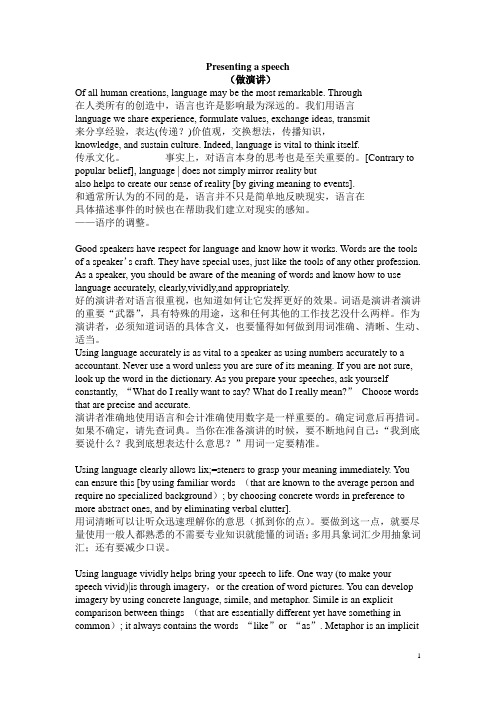
Presenting a speech(做演讲)Of all human creations, language may be the most remarkable. Through在人类所有的创造中,语言也许是影响最为深远的。
我们用语言language we share experience, formulate values, exchange ideas, transmit来分享经验,表达(传递?)价值观,交换想法,传播知识,knowledge, and sustain culture. Indeed, language is vital to think itself.传承文化。
事实上,对语言本身的思考也是至关重要的。
[Contrary to popular belief], language | does not simply mirror reality butalso helps to create our sense of reality [by giving meaning to events].和通常所认为的不同的是,语言并不只是简单地反映现实,语言在具体描述事件的时候也在帮助我们建立对现实的感知。
——语序的调整。
Good speakers have respect for language and know how it works. Words are the tools of a speaker’s craft. They have special uses, just like the tools of any other profession. As a speaker, you should be aware of the meaning of words and know how to use language accurately, clearly,vividly,and appropriately.好的演讲者对语言很重视,也知道如何让它发挥更好的效果。
学术英语综合Unit1 译文

学术英语综合U n i t1译文-CAL-FENGHAI.-(YICAI)-Company One1第一单元经济学Text A感谢“看不见的手”杰夫·雅各比英国清教徒建立普利茅斯殖民地后经历了他们的第一次大丰收,从那以后,感恩全能的上帝就一直是感恩节的主题……今天,全美数百万的家庭,都在感激上帝所赠与的众多礼物——桌上的盛宴、所爱之人的陪伴、过去一年的健康和好运、战争时期国内的和平、作为一个美国人或成为一个美国人所拥有的不可估量的优越感。
但我们中的大多数人不太可能感恩当地超市在本周出售了很多降价火鸡。
即使是虔诚的信徒们,也不太可能感恩那些让他们所爱之人得以回家共度佳节的航班时刻表,或者是感恩当地的影院在周末及时上映了《怒海争锋:极地远征》,又或者是感恩报纸的食物版块刊登了美味的蔓越莓苹果派的食谱。
或多或少我们都会觉得这些事情是理所当然的。
百货商店会在感恩节前储备火鸡,或者好莱坞在长假期时及时上映大片这些都不需要用奇迹来解释。
这一切都是自然而言的。
可上帝在其中扮演了什么角色呢然而在你因无数陌生人奉献了技能和劳动而得以度过的感恩节周末里,难道就没有什么事让你感到奇妙——甚至几乎无法解释吗例如,把火鸡端到餐桌上,需要成千上万人的努力——当然,有养鸟的禽类农场主,也有给它们提供营养的饲料批发商和把它们带到农场的卡车司机,更不用说还有设计孵化场的建筑师,建造它的工人,以及维持它运行的技术人员。
这只火鸡不得不经历宰杀、拔毛、检查、运输、卸载、包装、定价和展示。
完成这些任务的人又依次由完成其他任务的人配合支持——从提炼货车燃料汽油到制造包装肉类的塑料。
这些遍布各行各业的男男女女在过去的几个月里精准设计和安排时间,以便当你去买新鲜的感恩节火鸡时,就会买到一只或者多只——甚至还有几十只在等着你选购。
实现这一过程所需的合作水平之高令人难以置信。
但更令人难以置信的是:这整个过程都没有一个人去统筹协调。
并没有什么火鸡独裁者坐在某个指挥所,商议总体规划并发号施令。
综合学术英语教程 Unit

the Healthpartners Research Foundation
• HealthPartners is an integrated, nonprofit health care provider located in Bloomington, Minnesota offering care, coverage, research and education to its members, patients and the community. HealthPartners was founded in 1957 as Group Health, a consumergoverned nonprofit health plan with a board of directors made up of its own members and patients. In 1992, Group Health merged with MedCenters Health Plan, and together they formed HealthPartners. In late 2012 it was announced that HealthPartners would merge with Park Nicollet Health Services of St. Louis Park on January 1, 2013 following federal approval
Fraud and Academic Dishonesty
In this unit, you will
• learn about the concepts “academic integrity” and “academic dishonesty”;
学术英语 综合 Unit 1 PPT

Academic English — An Integrated Course
What is EAP?
English for Academic Purposes/EAP 内容:教材分为《学术英语》综合、 人文、理工、社科等。我们的课程 分为读学科主题文章、听专业相关 讲座、练学术口语、写学科专业论 文以及做学科相关研究等环节。
Unit 1
Economics
Unit Objectives
3. Listening • Make predictions about the content of a lecture 4. Speaking • Ask for information and clarification in a polite and effective way • Learn to do interviews and report the findings in an oral presentation
Unit 1
Economics
Text A Lead-in
How do you celebrate Spring Festival? Write down your activities in the table in the textbook and analyze whose skill and labor are required to make these activities possible.
Giving thanks for the 'invisible hand'
1. GRATITUDE TO THE ALMIGHTY is the theme of Thanksgiving, and has been ever since the Pilgrims of Plymouth brought in their first good harvest……Today, in millions of homes across the nation, God will be thanked for many gifts — for the feast on the table and the company of loved ones, for health and good fortune in the year gone by, for peace at home in a time of war, for the incalculable privilege of having been born — or having become — American.
罗立胜学术综合英语Unit

philosophies(哲学;哲 理)
organizations组织机构
seek to追求, 争取, 设法
in regard to关于; 至于
victims n.受害者;受骗 者;牺牲
domesticadj.家庭的;国 内的;驯养的 n.佣 人;家仆
violencen.猛烈;暴力; 暴行;强暴
Liberation n.
which can differ considerably from those of men. At work, as well as at home, many men today in modern North American society have to play very different roles than their fathers did. They are, as a result, joining with other men in a countermovement called the Men’s Movement to seek to provide one another with the support they need to cope with the roles expected of men in today’s world.
解放;解放运动(为获得 平等权利和地位的行 为)
Part
Pre-listening
Listening
A
Background Information New Words and Expressions
Part masculism, men’s health, B anti-sexism and men’s / fathers’ rights. Participants vary in terms of religion, politics and sexuality with a number of women also
学术英语综合Unit1
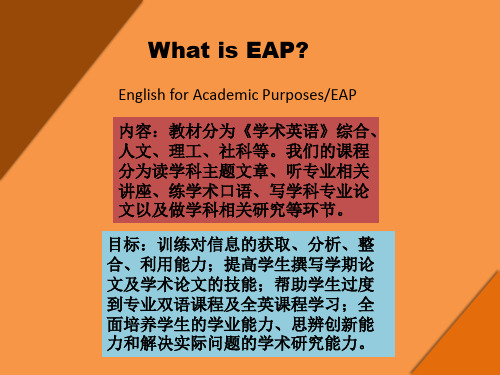
Unit 1
Economics
Adam Smith (16 June 1723 – 17 July 1790) was a Scottish moral philosopher, pioneer of political economy, and key Scottish Enlightenment figure.
What is EAP?
English for Academic Purposes/EAP
内容:教材分为《学术英语》综合、 人文、理工、社科等。我们的课程 分为读学科主题文章、听专业相关 讲座、练学术口语、写学科专业论 文以及做学科相关研究等环节。
目标:训练对信息的获取、分析、整 合、利用能力;提高学生撰写学期论 文及学术论文的技能;帮助学生过度 到专业双语课程及全英课程学习;全 面培养学生的学业能力、思辨创新能 力和解决实际问题的学术研究能力。
5. Writing • Understand what kind of topic is suitable
and manageable for a term paper
Unit 1
Economics
Unit Objectives
6. Researching • Independently locate and study a variety
Unit 1
Economics
Text A Overview
1. Summarize the main ideas of Text A. 2. Do Task 1/Critical reading and thinking.
Use the labor and skills behind the Thanksgiving weekend as examples to illustrate the concept of “the invisible hand”
学术英语 综合Unit 4

• Comprehend stylistic differences between formal and informal English and acquire some formal expressions
精选课件
6
Unit 4
Environment
Text A Lead-in
Work in groups of 4-5 and brainstorm a list of consequences of imbalance between people and nature.
精选课件
15
Unit 4
Environment
Text B Overview
1. What is critical reading?
Hale Waihona Puke Critical reading or academic reading is an active process that involves you in evaluating what you read. Reading critically is largely a process of asking questions. The sorts of questions that you need to ask include: • What position is the writer presenting? • What evidence is the writer giving to support his or her
精选课件
10
Unit 4
Environment
Text A Supplementary information
1. Sustainable development
学术综合英语_罗立胜 U1
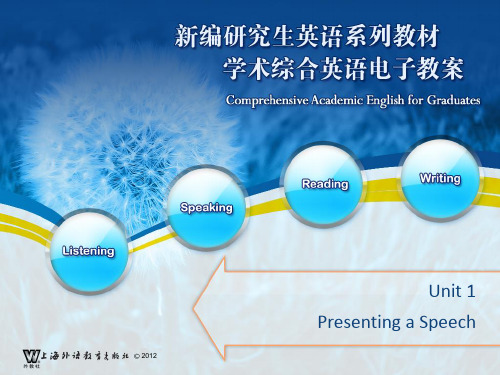
Part A Part B
Pre-listening
Background Information
Listening
New Words and Expressions
plaza, toll station, toll bar or toll gate. This building is usually found on either side of a bridge and at exits. Three systems of toll roads exist: open (with mainline barrier toll plazas); closed (with entry / exit tolls) and all-electronic toll collection (no toll booths, only electronic toll collection gantries at entrances and exits, or at strategic locations on the mainline of the road). Toll roads have been criticized as being inefficient in three ways: 1. They require vehicles to stop or slow down, manual toll collection wastes time and raises vehicle operating costs.
Part A Part B
Pre-listening
Task 1 Listen and Take Notes
Listening
Task 2 Listen for Details
学术综合英语_罗立胜 U

Part A Part B
Pre-listening
Background Information
Listening
New Words and Expressions
plaza, toll station, toll bar or toll gate. This building is usually found on either side of a bridge and at exits. Three systems of toll roads exist: open (with mainline barrier toll plazas); closed (with entry / exit tolls) and all-electronic toll collection (no toll booths, only electronic toll collection gantries at entrances and exits, or at strategic locations on the mainline of the road). Toll roads have been criticized as being inefficient in three ways: 1. They require vehicles to stop or slow down, manual toll collection wastes time and raises vehicle operating costs.
Part A Part B
Pre-listening
Task 1 Listen and Take Notes
Listening
Task 2 Li lecture and try to get its main ideas by taking notes. Fill in the blanks according to your notes. 1.The lecture is mainly about ___________________________ the relationship between _____________________________________________ road building and economic development . grain and 2. The two important agricultural products are _______ _______ cotton . 3. In the East they ____________ grew grain . In the South they _____________ grew cotton . ____________ . 4. Advantages of roads: _____ fast and convenient 5. Purpose for road building: to _______________________________ transport grain and cotton
学术综合英语Unitppt课件

exceptions, competitors are not allowed to pass the pace
car or other competitors during a caution phe field at a pre-determined safe speed,
Unit 3 Traffic
2012
Part
Pre-listening
Listening
A
Background Information New Words and Expressions
Part B
Pace Car
In motorsport, a pace car or
safety car is a car which limits the speed
entertainment as well as in training of
driver’s education courses taught in
educational institutions and private
businesses. They are also used for
research purposes in the area of human
2. Why is driving while talking on a cell phone worse than driving while drunk?
Part A news reporter is going to give a report on a research B study on driving while talking on a cell phone.
Part
Pre-listening
- 1、下载文档前请自行甄别文档内容的完整性,平台不提供额外的编辑、内容补充、找答案等附加服务。
- 2、"仅部分预览"的文档,不可在线预览部分如存在完整性等问题,可反馈申请退款(可完整预览的文档不适用该条件!)。
- 3、如文档侵犯您的权益,请联系客服反馈,我们会尽快为您处理(人工客服工作时间:9:00-18:30)。
His Politeness Is Her PowerlessnessDeborah Tannen There are many different kinds of evidence that women and men are judged differently even if they talk the same way. This tendency makes mischief in discussions of women, men and power. If a linguistic strategy is used by a woman, it is seen as powerless; if it is used by a man, it is seen as powerful. Often, the labeling of “women‟s language” as “powerless language” reflects the view of wo men‟s behavior through the lens of men‟s.他这样说是彬彬有礼,她这样说是低微无能黛博拉·塔嫩各种各样的证据表明:即使女性和男性说话方式相同,人们对他们的看法还是不同。
这种倾向导致有关女性、男性和有无能耐的讨论纷争不断。
女性说话讲究方式方法被认为是低微无能,而换成男性则被认为是有能力的表现。
视女性的语言为低微无能者的语言常常反映出男性看女性行为的视觉角度。
Because they are not struggling to be one-up, women often find themselves framed as one-down. Any situation is ripe for misinterpretation.This ambiguity accounts for much misinterpretation by experts as well as nonexperts, by which women‟s ways of thinking, uttered in a spirit of rapport, are branded powerless.Nowhere is this inherent ambiguity clearer than in a brief comment in a newspaper article in which a couple, both psychologists, were jointly interviewed. The journalist asked them the meaning of “being very polite.” The two experts responded simultaneou sly, giving different answers. The man said, “Subservience.” The woman said, “Sensitivity.” Both experts were right, but each was describing the view of a different gender.女性不为高人一等而拼搏,往往就被认为是低人一等。
在任何情况下都极易发生误会。
这也说明了为什么专家和非专家常常把女性以友善语言表述出来的思维方式曲解成低微无能的表现。
没有什么能比一家报社刊登的采访片段更能清楚地说明这种根深蒂固的歧义。
采访对象是一对心理学家夫妇,当记者问他们“表现得非常有礼貌”的含义时,这两位专家同时给出不同的答案。
男性回答说:“服从。
”女性回答说:“敏感。
”两位专家都是正确的,只不过每个人描述的是不同性别的观点。
Experts and nonexperts alike tend to see anything women do as evidence of powerlessness. The same newspaper article quotes another psychologist as saying, “A man might ask a woman, …Will you please go to the store?‟ where a woman might say, …Gee, I really need a few things from the store, but I‟m so tired.‟” The woman‟s style is called “covert,” a term suggesting negative qua lities like being “sneaky” and “underhanded.” The reason offered for this is power. The woman doesn‟t feel she has the right to ask directly.专家和非专家都习惯把女性的任何行为看为低微无能的表现。
以上同一篇报刊文章援引另一位心理学家的话说:“一个男人会这样问一个女人:…请你去一趟商店好吗?‟同样的情况下女人会说:…哎,我真的需要从商店买点东西,但是我实在太累了。
‟” 女性的这种表达方式被称为“隐蔽的”,该词含有“鬼祟”和“秘密”等贬义,而这样表述的原因归咎于一个“权”字,女人觉得她没有权利直接提出要求。
Granted, women have lower status than men in our American society. But this is not necessarily why they prefer not to make outright demands. The explanation for a woman‟s indirectness could just as well be her seeking connection. If you get your way as a result of having demanded it, the payoff is satisfying in terms of status: You‟re one-up because others are doing as you told them. But if you get your way because others happened to want the same thing, or because they offered freely, the payoff is rapport. You‟re neither one-up nor one-down by beinghappily connected to others whose wants are the same as yours.Furthermore, if indirectness is understood by both parties, then there is nothing covert about it: That a request is being made is clear. Calling an indirect communication covert reflects the view of someone for whom the direct style seems “natural” and “logical” -a view more common among men.的确,在我们(美国)社会里,女性的地位比男性低,但这不等于说他们不愿意提出直截了当的要求。
女性的这种间接方式很可能是因为她们在努力寻找某种关系。
如果愿望在自己的要求下得到满足,结果就是社会地位的胜利:你高人一等,因为别人按你的意志行事。
而如果你的愿望得到满足是因为他人的愿望恰好和你的一致,或者是因为对方心甘情愿,结果就是融洽和谐。
当你和对方需求一致而一拍即合时,你既不高人一等,也不低人一等。
而且如果双方都了解这种间接方式,那就根本不存在什么隐蔽:提出的要求很明确。
称间接的沟通方式为隐蔽反映出那些青睐直接沟通方式的人的观点,即直接的方式才是“自然的”、“合乎逻辑的”,这种观点在男性中更普遍。
Indirectness itself does not reflect powerlessness. It‟s easy to think of situations where indirectness is the prerogative of others in power. For example, a wealthy couple who knows that their servants will do their bidding need not give direct orders, but simply state wishes: The woman of the house says, “It‟s chilly in here,” and the servant sets about raising the temperature. The man of the house says, “It‟s dinner time,” and the servant sees about having dinner served. Perhaps the ultimate indirectness is getting someone to do something without saying anything at all: The hostess rings a bell and a maid brings the next course;or a parent enters the room where children are misbehaving and stands with hands on hips, and the children immediately stop what they‟re doing.间接方式本身并不反映低微无能。
我们不难想象出权势者中有特权的人是怎样使用间接方式的。
例如,一对有钱的夫妇用不着直接向听命于他们的佣人发号施令,而只须简单地说明其愿望,房子的女主人说:“这儿冷,”佣人会去调高室温;房子的男主人说:“是晚饭时间了,”佣人就会摆桌上菜。
